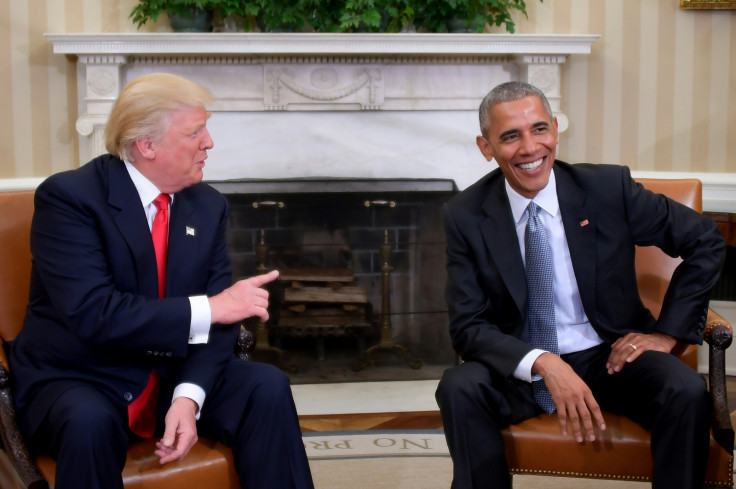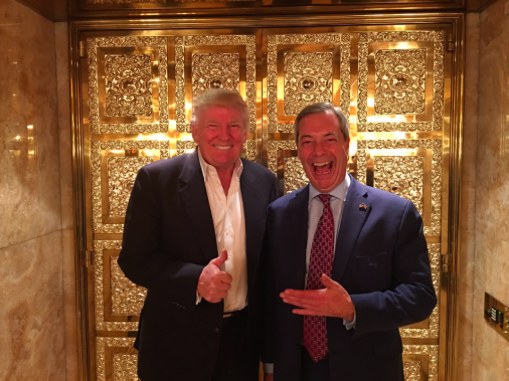With Donald Trump in the White House, it falls on Britain to promote free trade
Obama threatened to put us at the back of the queue for trade talks, but Trump says we'll be at the front.
There is one sense in which the election of Donald Trump is good news for the United Kingdom. We can now reasonably hope for a sympathetic attitude from Washington as we disengage from the EU. President Obama, a convinced Europhile, had ordered us to vote Remain.
He is a man used to getting his way and, when we disregarded his instructions, he reportedly lost his temper: our diplomats in Washington found their calls to his senior officials going unanswered.
Donald Trump, by contrast, is both an Anglophile and a Eurosceptic. During his campaign, he took to calling himself Mr Brexit. His response to our referendum result could not have been more different:
"The people have spoken. I think the EU is going to break up... the people are fed up, whether it's here or in other countries. You watch: other countries will follow."
Where the 44th president had threatened to put us at the back of the queue when it came to trade talks, the 45th says we'll be at the front. This is good news, obviously: a trade deal between the United States and the United Kingdom is a consummation devoutly to be wished. Ours would be a common market resting on shared language and law, kinship and custom, history and habit.
The United States is far and away the largest overseas investor in Britain, and Britain, similarly, is the largest overseas investor in the US, comfortably ahead of Japan. A US-UK trade deal, possibly also encompassing Canada, would bring benefits to all the participants.
Yet, from Britain's point of view, we should also want a US-EU deal. Trade is not a way to outperform your rivals; it is a way to make everyone better off. Britain has an immediate interest in the prosperity of its European allies: wealthy neighbours make good customers. As David Hume explained in the 18th century: "The increase in riches and commerce in any one nation, instead of hurting, commonly promotes the riches and commerce of all its neighbours".

Which is why we should be alarmed by some of the noises coming from both Brussels and Washington. The EU's reluctance to engage in global free trade was, for me, the clinching argument for leaving. If you have any doubts on this score, consider the assertion, now heard both from Eurocrats and from some British Remainers, that the EU shouldn't offer an open trade deal to Britain lest it encourage others to secede.
That argument is doubly revealing. First, it implicitly concedes that leaving the EU will make a country better off. Second, it exposes the essentially mercantilist mindset that still prevails in Brussels, two-and-a-half centuries after David Hume showed what was wrong with it. Even now, some Eurocrats see trade not as a way to benefit all participants, but as an instrument of state power.
Idealistic youngsters have taken to picketing G8 meetings, marching against TTIP [Transatlantic Trade and Investment Partnership] and joining Occupy sit-ins. They sincerely believe that, by opposing trade, they are standing up for poor countries against multinational corporations – when, in reality, they're doing precisely the opposite
There is nothing very new here. The EU has always prioritised politics over economics. That's why it was launched as a customs union rather than a free-trade area. That's why it has no trade deals in place with Australia, Brazil, China, India or the United States. That's why it insists on keeping the euro.
In the US, by contrast, Donald Trump's pronouncements on trade mark a breach with the consensus of the past 70 years. Not that we should over-value the opinions of one man: Trump is responding, as politicians do, to public opinion.

The trouble with free trade, politically speaking, can be summarised in four words: dispersed gains, concentrated losses. When the United States buys cheap Chinese steel, most Americans become a bit wealthier. Every factory using that steel enjoys an immediate productivity gain. Jobs are created. Prices fall, boosting household incomes and stimulating the economy. But, from an electoral point of view, the beneficiaries are unaware of the source of their good fortune. No one says, "I'm slightly better off as a result of free trade with China, so I'll vote for the party that agreed that deal". By contrast, newly unemployed steelworkers in Pennsylvania know exactly who to blame, and vote accordingly.
Free trade is going to be humanity's next big argument. It is extraordinary that, just as the expansion of the global commercial nexus has lifted an unprecedented number of people out of poverty, idealistic youngsters have taken to picketing G8 meetings, marching against TTIP and joining Occupy sit-ins. They sincerely believe that, by opposing trade, they are standing up for poor countries against multinational corporations – when, in reality, they're doing precisely the opposite.
People sometimes ask what Britain's post-EU role will be. Theresa May has already given the best possible answer: to be the global leader in free trade. Unrestricted commerce is the supreme instrument of poverty alleviation, conflict resolution and social justice. Someone has to make that case. Not for the first time, it looks as if that someone will be Britain.
Daniel Hannan has been Conservative MEP for the South East of England since 1999, and is Secretary-General of the Alliance of European Conservatives and Reformists. Follow @danieljhannan
© Copyright IBTimes 2025. All rights reserved.





















